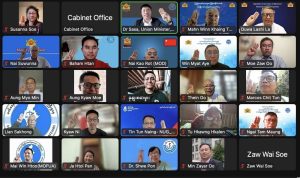Since the Myanmar military’s coup on February 1, 2021, the nation has been engulfed in political turmoil and widespread resistance. The National Unity Government (NUG), formed shortly after the coup as the legitimate representative of Myanmar’s people, symbolizes the fight against the oppressive military regime. Comprised of ousted lawmakers from the National League for Democracy, ethnic representatives, and civil society leaders, the NUG has garnered global recognition as the face of the Spring Revolution. However, balancing international diplomacy with domestic political imperatives has proven to be a daunting challenge.
Recently, the NUG’s Acting President Duwa Lashi La announced a shift in focus, prioritizing internal politics over international engagement and urging ministers in exile to come back to Myanmar. This strategic pivot is not only pragmatic but necessary for the long-term success of the revolution. While external support remains vital, the NUG’s ability to sustain the revolution and prepare for a post-military scenario ultimately depends on its capacity to mobilize grassroots support, build governance structures, increase cohesiveness within and between resistance fractions, and foster inclusivity within the country. By addressing these domestic imperatives, the NUG can reinforce its legitimacy and strengthen its foundation as a credible alternative to military rule.
Focusing inward is essential for the NUG to avoid becoming a “government in exile” disconnected from the realities on the ground. History has shown that resistance movements that fail to maintain strong ground connections risk losing their legitimacy. For the NUG, this means engaging directly with local communities, coordinating with ethnic armed organizations (EAOs) and anti-military People’s Defense Forces, and addressing the immediate needs of those suffering from military oppression.
Myanmar’s revolutionary landscape is unique in its diversity. The Spring Revolution has brought together a broad coalition of ethnic groups, pro-democracy activists, and younger generations seeking a democratic and inclusive future. This unity, however, is fragile. Ethnic tensions, religious intolerance, resource disparities, and differing priorities among resistance groups pose ongoing risks of fragmentation. By prioritizing inclusivity and cooperation, the NUG can transform these challenges into opportunities for building a more cohesive and representative movement.
A cornerstone of the NUG’s strategy is the establishment of governance structures in territories liberated from military control, mainly territories in central Myanmar that are not under any EAO’s control. Though limited in scope, these areas serve as testing grounds for the NUG’s vision of a democratic Myanmar. Through participatory decision-making, transparent administration, and service delivery, the NUG can demonstrate its ability to govern effectively and equitably.
Functional governance requires immediate attention to social systems. Building schools, clinics, and welfare networks in liberated areas can meet urgent humanitarian needs while fostering trust in the NUG’s leadership. For example, initiatives like a centralized free health system or centralized integrated education programs can provide tangible benefits to local communities, creating a stark contrast to the military’s neglect and brutality.
Inclusivity is central to the NUG’s long-term success. Myanmar’s history is marked by systemic discrimination and exclusion, particularly against ethnic and religious minorities and other marginalized groups. Addressing these grievances is not only a moral imperative but also a strategic necessity for sustaining unity within the resistance.
The Federal Democratic Charter offers a blueprint for a more inclusive Myanmar, but gaps remain in its implementation. Ensuring equal citizenship rights for all, including Rohingya, Muslims, Chinese, Hindus, and other historically marginalized communities, will reinforce the NUG’s commitment to justice and pluralism. Policies that promote gender equality, address class disparities, and recognize intersectional identities can further strengthen the revolution’s foundation.
One of the greatest challenges facing the NUG is resource allocation. Limited funds, stretched to cover both international lobbying efforts and domestic governance, require careful prioritization. Redirecting resources to support grassroots initiatives can yield immediate and visible benefits, but it must be balanced with the need for continued international advocacy.
Fragmentation remains another significant risk. The military junta has historically exploited divisions among resistance groups to weaken opposition. The NUG must counter this by fostering dialogue and establishing mechanisms for conflict resolution among ethnic and political factions. Shared goals, underpinned by mutual respect and understanding, can help preserve the functional unity necessary for achieving lasting change.
While focusing on internal matters, the NUG must not abandon its diplomatic efforts entirely. Regional powers like China and India, as well as ASEAN member states, will all play a crucial role in shaping Myanmar’s future. The NUG should adopt a realist approach, not only aligning with sympathetic actors but also engaging in pragmatic negotiations with less friendly countries, to secure humanitarian aid and political support.
The NUG president’s plan to prioritize internal politics is both timely and necessary. By deepening its connections with grassroots movements, addressing historical grievances, and building functional governance systems, the NUG can solidify its role as a legitimate and capable leader of the revolution. Overcoming challenges such as resource constraints, internal divisions, and security threats will require sustained commitment and innovative solutions.
Ultimately, the success of Myanmar’s Spring Revolution depends on its ability to remain grounded in the aspirations of its people. The NUG must act as a bridge between the present resistance and the future democratic state it envisions. By focusing inward and fostering a united, inclusive, and resilient movement, the NUG can lead Myanmar toward a brighter and more just future.

































